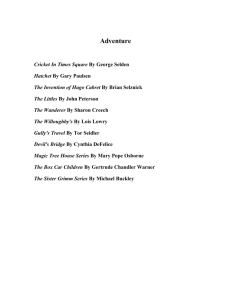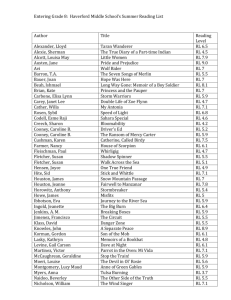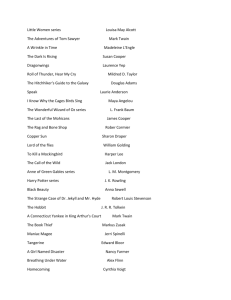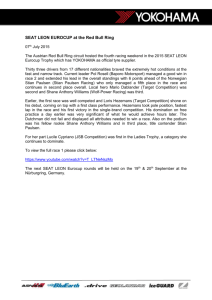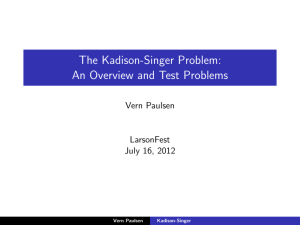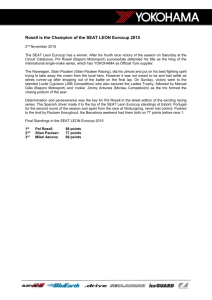Open problems Sofia Ortega Castillo July, 2012
advertisement
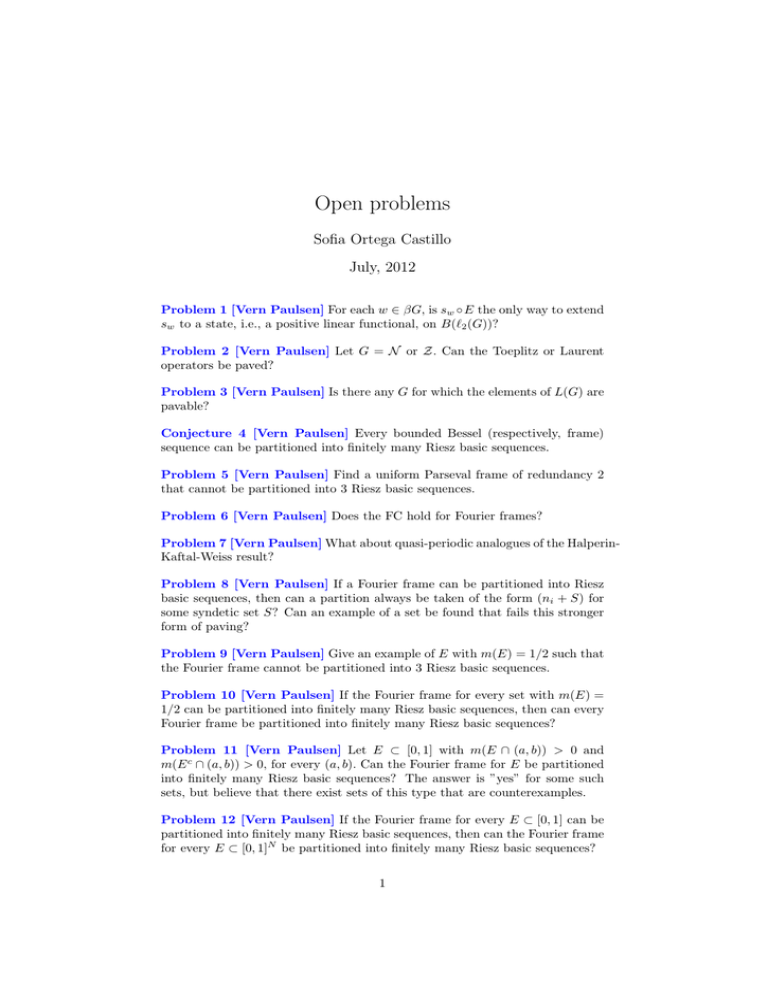
Open problems
Sofia Ortega Castillo
July, 2012
Problem 1 [Vern Paulsen] For each w ∈ βG, is sw ◦E the only way to extend
sw to a state, i.e., a positive linear functional, on B(`2 (G))?
Problem 2 [Vern Paulsen] Let G = N or Z. Can the Toeplitz or Laurent
operators be paved?
Problem 3 [Vern Paulsen] Is there any G for which the elements of L(G) are
pavable?
Conjecture 4 [Vern Paulsen] Every bounded Bessel (respectively, frame)
sequence can be partitioned into finitely many Riesz basic sequences.
Problem 5 [Vern Paulsen] Find a uniform Parseval frame of redundancy 2
that cannot be partitioned into 3 Riesz basic sequences.
Problem 6 [Vern Paulsen] Does the FC hold for Fourier frames?
Problem 7 [Vern Paulsen] What about quasi-periodic analogues of the HalperinKaftal-Weiss result?
Problem 8 [Vern Paulsen] If a Fourier frame can be partitioned into Riesz
basic sequences, then can a partition always be taken of the form (ni + S) for
some syndetic set S? Can an example of a set be found that fails this stronger
form of paving?
Problem 9 [Vern Paulsen] Give an example of E with m(E) = 1/2 such that
the Fourier frame cannot be partitioned into 3 Riesz basic sequences.
Problem 10 [Vern Paulsen] If the Fourier frame for every set with m(E) =
1/2 can be partitioned into finitely many Riesz basic sequences, then can every
Fourier frame be partitioned into finitely many Riesz basic sequences?
Problem 11 [Vern Paulsen] Let E ⊂ [0, 1] with m(E ∩ (a, b)) > 0 and
m(E c ∩ (a, b)) > 0, for every (a, b). Can the Fourier frame for E be partitioned
into finitely many Riesz basic sequences? The answer is ”yes” for some such
sets, but believe that there exist sets of this type that are counterexamples.
Problem 12 [Vern Paulsen] If the Fourier frame for every E ⊂ [0, 1] can be
partitioned into finitely many Riesz basic sequences, then can the Fourier frame
for every E ⊂ [0, 1]N be partitioned into finitely many Riesz basic sequences?
1
Problem 13 [Vern Paulsen] Does the NP hold for the Drury-Arveson space?
Problem 14 [Vern Paulsen] Does the NP hold for every contractively contained space iff it holds for every contractively contained Shields’ Hβ2 space?
Problem 15 [Vern Paulsen] Does NP hold for Shields’ Hβ2 spaces?
Problem 16 [Vern Paulsen] Let φ be a singular inner function. Does the FP
hold for H 2 (D) φH 2 (D)?
Problem 17 [Vern Paulsen] Let G be a countable discrete group, and let t ∈
βG. Can one use dynamical properties of t to get information about uniqueness
or non-uniqueness of extensions for the state st ?
Problem 18 [Vern Paulsen] If for a minimal idempotent t the state st has a
unique extension, then is KSP true?
Problem 19 [Vern Paulsen] Are Bice’s ultrafilters universally strongly wandering in this sense?
Problem 20 [Vern Paulsen] If a point w ∈ G∗ is strongly wandering then is
the extension unique?
Problem 21 [Ole Christensen] Let {Dj Tk ψ1 }j,k∈Z and {Dj Tk ψ˜1 }j,k∈Z be
c̃
Bessel sequences in L2 (R). Assume that suppψ1 is NOT contained in [−1, 1].
Do there exist wavelet systems {Dj Tk ψ2 }j,k∈Z and {Dj Tk ψ˜2 }j,k∈Z such that
{Dj Tk ψ1 }j,k∈Z ∪ {Dj Tk ψ2 }j,k∈Z and {Dj Tk ψ˜1 }j,k∈Z ∪ {Dj Tk ψ˜2 }j,k∈Z form
dual frames for L2 (R)?
Problem 22 [Ole Christensen] If yes to the previous (maybe with additional
c̃
c1 and ψ
c2 are compactly supported, but suppψ
constraints): If ψ
1 is not a subset
˜
of [−1, 1] \ [−, ] for some > 0, can we choose ψ2 and ψ2 to have compactly
supported Fourier transforms?
Conjecture 23 [Ole Christensen] Let {Dj Tk ψ1 }j,k∈Z be a wavelet frame
with upper frame bound B. Then there exists D > B such that for each K ≥ D,
there exists ψ˜1 ∈ L2 (R) such that {Dj Tk ψ˜1 }j,k∈Z ∪ {Dj Tk ψ˜1 }j,k∈Z is a tight
frame for L2 (R) with bound K.
Problem 24 [Michael Frank] Whether each kernel of a surjective bounded
module operator between Hilbert C*-modules is a toplogical direct summand of
the domain of this operator, or not?
It is known that the question has a general affirmative answer for adjointable
bounded module operators. Results on that can be found in Huaxin Lin, ”Cuntz
semigroups of C ∗ -algebras of stable rank one and projective Hilbert modules”,
math.OA/1001.4558, http://arxiv.org/abs/1001.4558, and in M. Frank,
V. I. Paulsen, ”Injective and projective Hilbert C ∗ -modules, and C ∗ -algebras of
compact operators”, math.OA/0611349, http://arxiv.org/abs/math/0611349.
2
Furthermore, for some Hilbert C ∗ -modules not any bounded module operator
admits an adjoint. The more, there are even projection operators (i.e. P = P 2 )
such that they are non-adjointable. They have to be investigated.
In case of an affirmative answer every element of the category consisting of
Hilbert C ∗ -modules over an arbitrarily fixed C ∗ -algebra as objects and bounded
C ∗ -linear homomorphism as morphisms would be projective. This would be an
interesting fact for several applications.
Problem 25 [Keri Kornelson] Consider the Hilbert space L2 (µλ ).
• Is it ever possible to for L2 (µλ ) to have a Fourier basis , i.e. an orthonormal
basis (ONB) of complex exponential functions?
• If so, does the existence of a Fourier basis depend on λ?
• Given a spectral measure, what are the possible spectra?
• Could a non-spectral measure have a frame of exponential functions?
Problem 26 Let A = ⊕Mn (C) and φ be the transpose map. Does φ have a
Hilbertian dilation?
Problem 27 Is there any quantitative dilation theorem corresponding to the
divergence rate of the sequence {||φn ||}∞
n=1 ?
Problem 28 Does every normal map have a normal dilation?
Problem 29 For non-commutative algebra case, if H is separable, can the
dilation space Z be always chosen to be separable?
Problem 30 Rank-preserving problem: Let E : Σ → B(X, Y ) be an operatorvalued measure. Is it always true that within an appropriate notion of rank
function there is a projection valued dilation F such that r(F (B)) = r(E(B))
for every B ∈ Σ.
Problem 31 Let V be a degenerate inner product space. Does V admit a
Parseval frame? If so, does it admit a Parseval frame of any given length k? Is
this frame non-trivial?
Problem 32 Is there a way to tell if a given frame is an analysis frame? For
example, if the frame is a basis we need only check if GB is invertible. This
doesn’t work in general, can we find something that does?
Conjecture 33 Let A = C ∗ -algebra + unital + sep. + simple + non-elementary
+ nuclear. TFAE:
• A = finite nuclear dimension;
• A = Z−stable (i.e. A =∼
= A ⊗ Z)
• A = strict comparison of positive elements (i.e. whenever a, b ∈ A+ satisfy
dτ (a) < dτ (b), ∀τ ∈ T (A), then a b.)
3
Problem 34 Which smooth manifolds have a moving FUNTF?
Problem 35 What is the least number of vectors we need for a moving FUNTF
on a sphere (or other manifold)?
Problem 36 Can we find a moving basis for spaces other than the tangent
space of manifolds?
• Vector bundles on circle S × N × Rn , generalization of Mobius strip.
Problem 37 How does frame force act on a single unit-norm frame? How about
global continuity over a manifold?
Problem 38 Given
let
P∞
k=0
with R = 1, let D denote its set of divergence, i.e.
D = {|z| = 1 :
∞
X
ak zk diverges}.
k=0
We define a subset D0 of D by
D0 = {z ∈ D : there exists a λ−permutation σ such that
∞
X
aσ(k) z k converges}.
k=0
• Can all of the points in D0 be fixed by the same λ−permutation?
• What are the topological properties of D0 ?
Problem 39 Can we always enlarge or transform a Parseval frame to an error
partitioning frame? If so, is there a canonical choice?
Problem 40 Do fields of other degenerate inner product spaces with a different
characteristic have an oscillatory pattern show up in the probabilities as well?
Problem 41 Are there more well-defined relationships between weight classes,
errors, and probabilities?
Problem 42 Given a message vector, what is a good choice for the Parseval
frame such that the frame has minimal cardinality and highest probability of
minimal error?
Problem 43 Are there nearly equi-distant Grassmanian packings?
Problem 44 Is it possible to shrink s with orthogonalization to get better Riesz
bounds?
Problem 45 Is it possible to start from concrete (random) RIP matrices?
Problem 46 Is it possible to design RIP matrices via fusion frames (straightjacket approach)?
4
Problem 47 Is performance in specific locations possible?
Conjecture 48 [Richard V. Kadison] Every local derivation of A (R) is a
derivation.
Problem 49 [Ken Dykema] Let M be a factor of type Πi and let p ∈ M be
a projection. Suppose that τ (p) is irrational. Is p − τ (p)1 the real part of a
quasi-nilpotent in M ?
Problem 50 [Darren Speegle] If for every c > 0, lim supx→∞ |f (x)|ecx = 0,
then does f have linearly independent time-frequency shits?
Problem 51 [Darren Speegle] Let K =supp(f ). If lim inf R→∞ inf x∈R
0, then must f have linearly independent time-frequency shifts?
|K∩[x,x+R]|
R
Problem 52 [Russ Thompson] Is L(n) invariant in changes of generating
set? The conjecture is yes, i.e. pn (g1 , g2 ) is invariant.
Problem 53 [Russ Thompson] Is L(n) a geometric invariant? I.e. if G and
H are quasi-isometric, is L(n) the same?
Problem 54 √[Russ Thompson] Find a finitely presented group with L(n)
distinct from n and n.
• Metabelian groups that are quotients of Z o Z 2 and Z o Z
• Self-similar groups. Estimates exist for some Grigorchuk groups.
Problem 55 [Russ Thompson] Give any example with escape exponent in
(1/2, 3/4).
Problem 56 [Su Gao] Find simpler realizations of universal orbit equivalence
for actions of the unitary group U (H).
Problem 57 [Stephen Gustafson] Is there global well-posedness for Schrodinger
maps below energy 4π?
Problem 58 [Brett Wick] Corona problem for MBσ2 :
Suppose σ ≥ 0 and f1 , · · · , fN ∈ MBσ2 (Bn ) satisfy
1 ≥ |f1 (z)|2 + · · · + |fN (z)|2 ≥ δ > 0 ∀z ∈ Bn .
Do there exist g1 , · · · , gN ∈ MBσ2 (Bn ) such that
•
PN
fj (z)gj (z) = 1 ∀z ∈ Bn ,
•
PN
||gj || ≤ C(δ, σ, N, n)?
j=1
j=1
5
=
Problem 59 [Brett Wick] Baby corona problem for Bσ2 :
Suppose σ ≥ 0 and f1 , · · · , fN ∈ MBσ2 (Bn ) satisfy
1 ≥ |f1 (z)|2 + · · · + |fN (z)|2 ≥ δ > 0 ∀z ∈ Bn .
Let h ∈ Bσ2 . Do there exist l1 , · · · , lN ∈ Bσ2 such that
PN
•
j=1 fj (z)lj (z) = h(z) ∀z ∈ Bn ,
•
PN
j=1
||lj || ≤ C(δ, σ, N, n)||h||2B 2 ?
σ
Problem 60 [Brett Wick] Let σ = N/2 and U = Bn or DN . Suppose f1 , f2 ∈
H ∞ (U ) satisfy
1 ≥ |f1 (z)| + |f2 (z)| ≥ δ > 0 ∀z ∈ U.
Do there exist g1 , g2 ∈ H ∞ (U ) such that
1 = f1 g1 + f2 g2 and ||gj ||H ∞ ≤ C(δ, N )?
6
